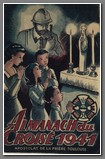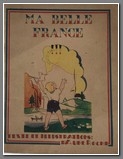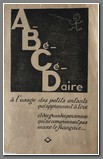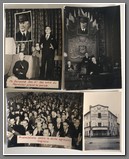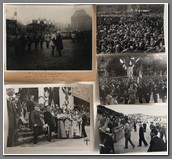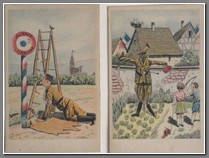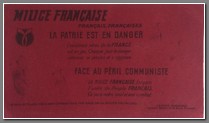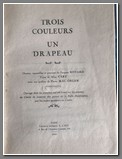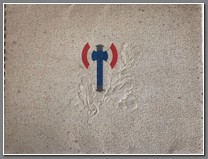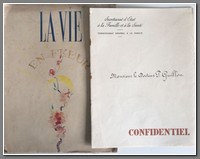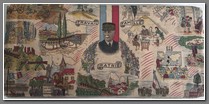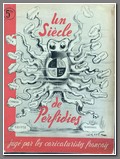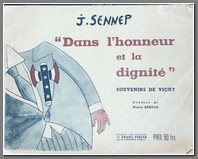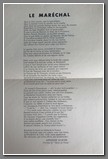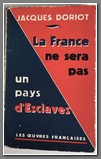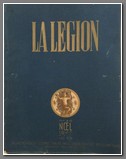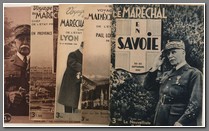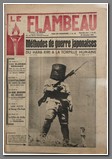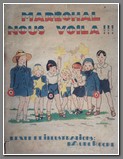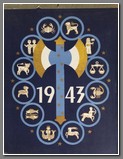VIF 1764 issues of Le Flambeau. An organ of the “Croix de Feu”, it was published between 1929 and 1942. B
Price: $800.00
Note (from Wikipedia): The Croix-de-Feu (Cross of Fire) was a nationalist French league of the Interwar period, led by Colonel François de la Rocque (1885–1946). After it was dissolved, as were all other leagues during the Popular Front period (1936–38), La Rocque established the Parti social français (PSF) to replace it. It was primarily a group of veterans of the First World War, those who had been awarded the Croix de guerre 1914-1918. The group was founded on 26 November 1927 by Maurice d'Hartoy, who led it until 1929. The honorary presidency was awarded to writer Jacques Péricard. Also in 1929, the movement acquired its own newspaper, Le Flambeau. At its creation, the movement was subsidized by the wealthy perfumer François Coty, and was hosted in the building of Le Figaro. It benefited from the Catholic Church's 1926 proscription of the Action Française, which prohibited Catholics from supporting the latter. Many conservative Catholics became members of the Croix-de-feu instead, including Jean Mermoz and the young François Mitterrand.
Unlike the Unions latines, which had promoted algérianité (Algerianness) and gained the support of French settlers, the CF adopted a new approach. European settlers in Algeria tended to support authoritarian and imperialist government over French republicanism. They were anti-Semitic and xenophobic. Believing that Algerian Europeans were a new race, they saw themselves as "youthful, virile and brutal" and Metropolitan France as "degenerate, effeminate and weak". They often resorted to the use of the force against Muslim and Jewish Algerians.
The Croix-de-feu had a massive propaganda campaign that won thousands of members in Constantine and Algiers. It proposed an alliance with local Muslims and attacked the left. Scholars see that as a tactic to funnel revolutionary and separatist frustrations caused by economic disparity between European settlers and the local Algerian people. It used different propaganda in Oran, more similar to Jules Molle and the Unions latines, because Oran had fewer Muslims and was more anti-Semitic.
Under Lieutenant-Colonel François de La Rocque, who took over in 1930, the Croix-de-Feu took its independence from François Coty and left the building of Le Figaro for rue de Milan. It organised popular demonstrations in reaction to the Stavisky Affair in the hope of overthrowing the Second Cartel des gauches, a left-wing coalition government. La Rocque quickly became a hero of the far right, which opposed the influences of socialism and "hidden Communism" but was skeptical about becoming counterrevolutionary.
Under la Rocque, the movement advocated a military effort against the "German danger" and supported corporatism and an alliance between capital and labour. It enlarged its base by creating a number of secondary associations, thus including non-veterans in its ranks. To counter the monarchist Action française and its slogan Politique d'abord! "Politics First!"), de la Rocque invented the motto Social d'abord! ("Social First!"). In his book, Le Service Public ("Public Service)", which was published in November 1934, he argued in favour of a reform of parliamentary procedures; cooperation between industries according to their branches of activities; a minimum wage and paid holidays; women's suffrage (also upheld by the monarchist Action française, which considered that women, often devout, would be more favorable to their conservative thesis) etc.
The Croix de Feu was one of the right-wing groups that pushed anti-Semitic politics in 1935. Along with Volontaires Nationaux and others, the Croix de Feu used the political developments in Metropolitan France like the election of Léon Blum, a Jewish Prime Minister, and the Popular Front to inflame anti-Semitic sentiment in the colony. The 1936 elections saw the victory of anti-Semitic municipal governments, boycotts against Jewish business (heavily promoted by the Radical Party newspaper Le Republicain de Constantine) and physical violence and attacks against Jews. The Croix de Feu acted in concert with other anti-Semitic parties, including the Rassemblement National d'Action Sociale led by Abbé Lambert, Action française and Parti Populaire français. Membership in Croix de Feu grew from 2500 in 1933, to 8440 in 1935 and 15000 in 1936. In November 1937, the number of 700,000 members was mentioned in a German journal.


